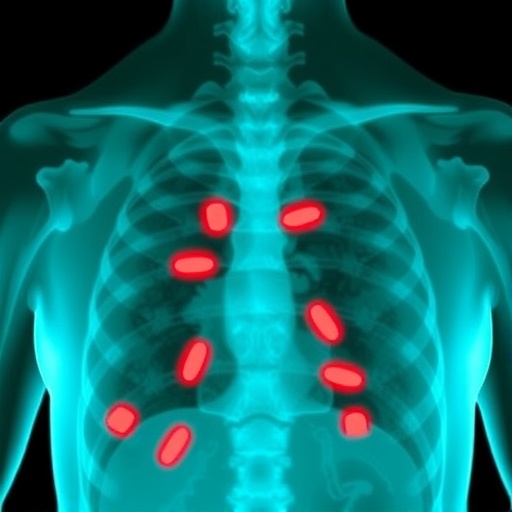In a groundbreaking systematic review and meta-analysis recently published in BMC Cancer, researchers illuminate the complex relationship between statin use and clinical outcomes in cancer patients undergoing radiotherapy. This comprehensive investigation addresses a compelling yet controversial area of oncologic care, scrutinizing whether the concurrent administration of statins—commonly prescribed cholesterol-lowering agents—affects survival rates and the incidence of adverse events during radiation treatment.
The global oncology community faces increasing interest in the repurposing of established medications like statins for their potential anti-cancer benefits. Preclinical studies have suggested pleiotropic effects of statins, including modulation of tumor cell proliferation, apoptosis, and inflammation, warranting robust clinical evaluation. Yet, prior clinical data have been incongruous, motivating the team led by Shokr et al. to synthesize findings across two decades of research to provide clarity.
This systematic review searched major medical databases including MEDLINE, EMBASE, Web of Science, Scopus, and PubMed for studies published from January 2000 through June 2024. Eligible studies comprised adult patients with histologically confirmed malignancies who received oral statins during radiotherapy. A total of 21 studies met inclusion criteria, combing together data from 19 observational cohorts and 2 randomized clinical trials encompassing diverse tumor histologies.
The investigators analyzed overall survival (OS) rates in patients stratified by statin usage, employing odds ratios (ORs) with 95% confidence intervals (CIs) to quantify the magnitude of associations. They also explored the influence of statin intensity and cancer subtype on survival outcomes through meta-regression, providing a nuanced understanding of these variables’ interplay. Furthermore, the study assessed radiation-related adverse events to evaluate the safety profile of statin use in this vulnerable patient population.
Interestingly, the pooled data revealed no significant difference in overall survival between statin users and non-users (OR 1.29; 95%CI: 0.99 to 1.69). Similarly, escalating statin intensity did not correlate significantly with improved survival outcomes (β-coefficient 0.20; 95%CI: -1.22 to 1.62; p = 0.60). However, distinct patterns emerged when analyzing specific cancer types, indicating the potential for tailored treatment paradigms.
The meta-regression highlighted statistically significant heterogeneity in survival linked to cancer subtype (β-coefficient -0.29; 95%CI: -0.45 to -0.13; p < 0.01). Notably, patients with oesophageal squamous cell carcinoma, head and neck squamous cell carcinoma, glioblastoma, and prostate cancer demonstrated improved survival associated with statin use. Conversely, statin consumption correlated with reduced survival in non-small cell lung cancer (NSCLC) and brain metastases, underscoring the importance of tumor biology in mediating therapeutic interactions.
Beyond survival metrics, the study’s analysis of adverse events revealed a complex risk-benefit landscape. Statin users with NSCLC exhibited a greater risk of major adverse cardiac events (OR 2.22; 95%CI: 1.38 to 3.59), raising caution for cardiovascular safety in this subgroup. Meanwhile, patients with head and neck squamous cell carcinoma on statins had a markedly higher incidence of grade 2 or greater mucositis (OR 26.00; 95%CI: 4.09 to 165.10), a common and debilitating side effect of radiotherapy.
In contrast, protective effects emerged in certain contexts; statin therapy was linked to a reduced incidence of ischemic stroke in patients with nasopharyngeal carcinoma (OR 0.80; 95%CI: 0.67 to 0.95). Additionally, prostate cancer patients taking statins experienced lowered risks of rectal toxicity related to pelvic radiation (OR 0.45; 95%CI: 0.23 to 0.88), suggesting statin-mediated modulation of inflammatory processes could be beneficial in mitigating radiation-induced complications.
These differential outcomes underscore that statin impact in the oncologic radiotherapy setting is multifaceted and heavily influenced by cancer biology, treatment modalities, and individual patient factors. The absence of a uniform survival benefit prompts caution in broadly recommending statins solely for oncologic purposes without deeper stratification and risk assessment.
Importantly, this study also acknowledges the inherent limitations of included longitudinal cohorts, such as possible confounding and selection biases, which may influence observed associations. Randomized controlled trials with rigorous adjustment for comorbidities, performance status, and concurrent therapies remain the gold standard for definitive evidence and are warranted to further delineate statins’ role.
The authors emphasize the necessity of personalized medicine approaches, proposing that future investigations must integrate molecular tumor profiling, pharmacogenomics, and dose-optimization strategies to harness statins’ potential anti-cancer effects while minimizing risks. Moreover, exploring statin combinations with emerging targeted therapies and immunotherapies may reveal synergistic opportunities.
This comprehensive meta-analytic effort represents a pivotal addition to the oncologic literature, fostering informed clinical decision-making amid increasingly complex cancer management paradigms. By systematically dissecting the interplay between statins, radiotherapy, and cancer-specific factors, it lays groundwork for subsequent hypothesis-driven trials and translational research.
In summary, while statin use during radiotherapy does not universally improve survival, its influence varies significantly by cancer type and is accompanied by both protective and adverse effects. Clinicians must weigh the cardiovascular and oncologic risks and benefits carefully, tailoring statin therapy within multidisciplinary frameworks. As research progresses, precision oncology strategies hold promise in unlocking innovative roles for statins, potentially transforming supportive cancer care in the years ahead.
Subject of Research: The impact of statin use on survival outcomes and radiotherapy-related adverse events in cancer patients receiving radiotherapy
Article Title: Impact of statin use on survival and adverse events in patients with cancer receiving radiotherapy: a systematic review and meta-analysis
Article References:
Shokr, H., Liao, W.C., Faivre-Finn, C. et al. Impact of statin use on survival and adverse events in patients with cancer receiving radiotherapy: a systematic review and meta-analysis. BMC Cancer 25, 1666 (2025). https://doi.org/10.1186/s12885-025-15038-3
Image Credits: Scienmag.com




